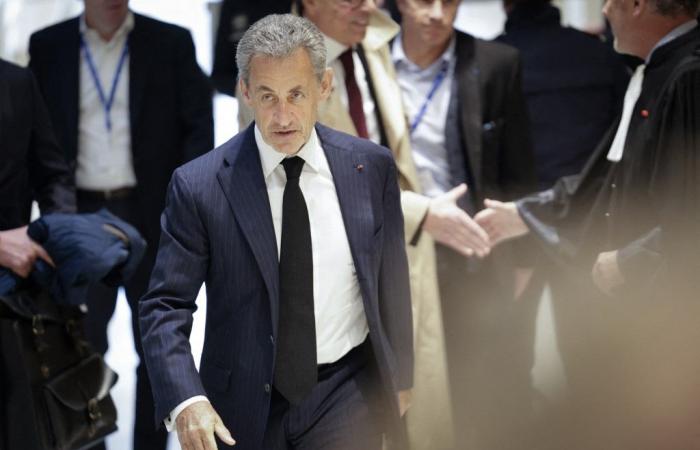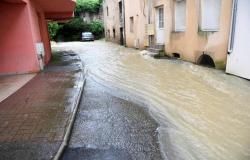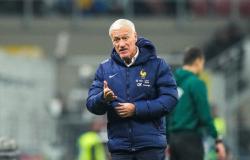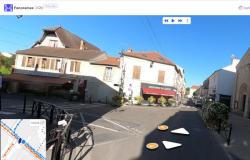
Separate defendants? A few minutes before the opening of the trial on suspicion of Libyan financing of Nicolas Sarkozy's 2007 campaign, four of the eight accused present (out of thirteen in total) did not sit on the bench reserved for them. Four former ministers sit on the folding seats, in front of their lawyers.
Claude Guéant, Brice Hortefeux, Éric Woerth and Nicolas Sarkozy – seated in that order – meet again at the Paris court, thirteen years after having parted in the Council of Ministers. The former head of state was able to act as guide: it was already in this same courtroom, 2.01, that he was convicted at first instance in the Bismuth cases (confirmed by the court of cassation in December) and Bygmalion (awaiting the decision of the Court of Cassation).
Right leg crossed over the left, a hand hovering over the lips or the impeccably shaved chin: the same body language is adopted by the four accomplices. A falsely relaxed attitude, to contrast with the seriousness of the moment. Since this Monday, and until at least April 10, the four former ministers are at great risk.
In exile, Ziad Takieddine takes charge again
In particular the former President of the Republic and his two former lieutenants, Claude Guéant and Brice Hortefeux, suspected of having established a corruption pact with the Libyan dictator Muammar Gaddafi, so that he would finance the presidential campaign of Nicolas Sarkozy in 2007, in exchange for diplomatic, judicial and economic compensation.
The referral order, drawn up in August 2023 by investigative judges Aude Buresi and Virginie Tilmont, is particularly burdensome for these three defendants, who each face 10 years of imprisonment. The file, detailed over nearly 500 pages, provides a large body of evidence proving, according to investigators, that an agreement was indeed made. This does not change Nicolas Sarkozy's defense, according to his lawyer, who responded to journalists before the start of the hearings: “He will fight the artificial construction imagined by the prosecution. There is no Libyan financing of the campaign,” said M.e Christophe Ingrain.
Sitting quietly on the bench facing the judges, Alexandre Djouhri, a usually fanciful and provocative businessman, is also present. The intermediary, suspected of having created links between Libya and Claude Guéant but also of having exfiltrated from Tripoli then from Paris a strong man of the Gadafist regime likely to speak, had several times evaded the summons of the judges of instruction but is ultimately present before the criminal court.
His eternal rival, Ziad Takieddine, however, is absent. The Lebanese businessman, key protagonist in the case and almost the only one to have testified for the prosecution, has not returned to France since his conviction in 2020 to five years in prison in the Karachi affair. On the other hand, he responded to RTL on Monday, justifying his absence with one of these falsely naive little sentences of which he has the secret: “I am not summoned, no one summoned me.” Ziad Takieddine, who could be interviewed by videoconference, reiterated his accusations on Monday: “ Sarkozy went to see Gaddafi, he asked for money from Gaddafi. I can say that Gaddafi paid him up to 50 million euros.”
“In the file, we counted no less than 16 different versions given by Ziad Takieddine so it could be a 17th version that we will take with as much caution as the 16 others,” Nicolas Sarkozy's advisor, Christophe Ingrain, responded immediately.
Brice Hortefeux's visit to Libya already mentioned
One of the versions must however be dismissed: that of the famous retraction of Ziad Takieddine, when in 2020 he gave interviews to Paris Match and BFM TV to clear Nicolas Sarkozy. False confessions according to the investigating judges, according to whom the clan of the former head of state paid the businessman.
This Monday, devoted to the usual priority questions of constitutionality (QPC) – a procedure desired by Nicolas Sarkozy himself when it was created in 2008 – the court rejected the defense's first requests.
The defense then pleaded“incompetence of the criminal court” to judge the facts. Nicolas Sarkozy and Brice Hortefeux being ministers in 2005 when they went to Libya – when, according to the investigating judges, the corruption pact was made – the latter's lawyer believes that only the Court of Justice of the Republic, the only jurisdiction authorized to judge members of a government on acts taken in the exercise of their function, could be seized in this context.
However, Brice Hortefeux's meeting with Abdallah Senoussi, brother-in-law of Muammar Gaddafi and sentenced to life imprisonment by France for terrorism, was not linked to this mandate according to the public prosecutor: “Everything shows that the meeting with Mr. Senoussi was secret and took place on the sidelines of the official visit. »
Furthermore, the alleged acts go well beyond the exercise of their mandates, and the case law being constant on this point, the request should not be successful and the criminal court will be able to examine this vast state affair. However, we will have to wait until next week for the debates to really begin, with “the hypothesis of financing by Libya” as the first topic on the agenda.
The media that billionaires can't afford
We are not funded by any billionaire. And we are proud of it! But we face ongoing financial challenges. Support us! Your donation will be tax-free: giving €5 will cost you €1.65. The price of a coffee.
I want to know more!





